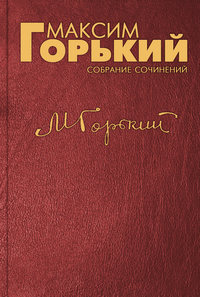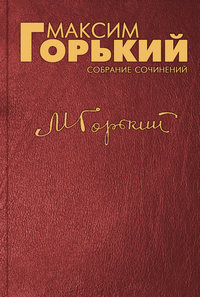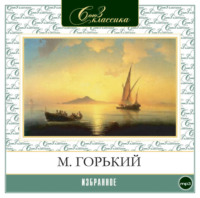 полная версия
полная версияThe Man Who Was Afraid
“I am afraid. Your fathers may learn of your sprees, and as they’ll give you a drubbing, I might also come in for a share.”
What he did not like in them was that they were leading a dissipated and depraved life, without their fathers’ knowledge, and that the money they were spending was either stolen from their parents or borrowed on long-termed promissory notes, to be paid with exorbitant interest. They in turn did not like him for this very reserve and aversion, which contained the pride so offensive to them. He was timid about speaking to people older than himself, fearing lest he should appear in their eyes stupid and thick-headed.
He often recalled Pelageya, and at first he felt melancholy whenever her image flashed before his imagination. But time went on, and little by little rubbed off the bright colours of this woman; and before he was aware of it his thoughts were occupied by the slender, angel-like Medinskaya. She used to come up to Ignat almost every Sunday with various requests, all of which generally had but one aim – to hasten the building of the lodging-asylum. In her presence Foma felt awkward, huge, heavy; this pained him, and he blushed deeply under the endearing look of Sophya Pavlovna’s large eyes. He noticed that every time she looked at him, her eyes would grow darker, while her upper lip would tremble and raise itself slightly, thus displaying very small white teeth. This always frightened him. When his father noticed how steadfastly he was staring at Medinskaya he told him one day:
“Don’t be staring so much at that face. Look out, she is like a birch ember: from the outside it is just as modest, smooth and dark – altogether cold to all appearances – but take it into your hand and it will burn you.”
Medinskaya did not kindle in the youth any sensual passion, for there was nothing in her that resembled Pelageya, and altogether she was not at all like other women. He knew that shameful rumours about her were in the air, but he did not believe any of them. But his relations to her were changed when he noticed her one day in a carriage beside a stout man in a gray hat and with long hair falling over his shoulders. His face was like a bladder – red and bloated; he had neither moustache nor beard, and altogether he looked like a woman in disguise. Foma was told that this was her husband. Then dark and contradicting feelings sprang up within him: he felt like insulting the architect, and at the same time he envied and respected him. Medinskaya now seemed to him less beautiful and more accessible; he began to feel sorry for her, and yet he thought malignantly:
“She must surely feel disgusted when he kisses her.”
And after all this he sometimes perceived in himself some bottomless and oppressive emptiness, which could not be filled up by anything – neither by the impressions of the day just gone by nor by the recollection of the past; and the Exchange, and his affairs, and his thoughts of Medinskaya – all were swallowed up by this emptiness. It alarmed him: in the dark depth of this emptiness he suspected some hidden existence of a hostile power, as yet formless but already carefully and persistently striving to become incarnate.
In the meantime Ignat, changing but little outwardly, was growing ever more restless and querulous and was complaining more often of being ill.
“I lost my sleep. It used to be so sound that even though you had torn off my skin, I would not have felt it. While now I toss about from side to side, and I fall asleep only toward morning. And every now and then I awaken. My heart beats unevenly, now, though tired out; often thus: tuk-tuk-tuk. And sometimes it sinks of a sudden – and it seems as though it would soon tear itself away and fall somewhere into the deep; into the bosom. Oh Lord, have pity upon me through Thy great mercy.” And heaving a penitent sigh, he would lift heavenward his stern eyes, grown dim now, devoid of their bright, sparkling glitter.
“Death keeps an eye on me somewhere close by,” he said one day morosely, but humbly. And indeed, it soon felled his big, sturdy body to the ground.
This happened in August, early in the morning. Foma was sound asleep when suddenly he felt somebody shaking him by the shoulder, and a hoarse voice called at his ear:
“Get up.”
He opened his eyes and saw that his father was seated in a chair near his bed, monotonously repeating in a dull voice:
“Get up, get up.”
The sun had just risen, and its light, falling on Ignat’s white linen shirt, had not yet lost its rosy tints.
“It’s early,” said Foma, stretching himself.
“Well, you’ll sleep enough later.”
Lazily muffling himself in the blanket, Foma asked:
“Why do you need me?”
“Get up, dear, will you, please?” exclaimed Ignat, adding, somewhat offended: “It must be necessary, since I am waking you.”
When Foma looked closely at his father’s face, he noticed that it was gray and weary.
“Are you ill?”
“Slightly.”
“Shall we send for a doctor?”
“The devil take him!” Ignat waved his hand. “I am not a young man any longer. I know it as well without him.”
“What?”
“Oh, I know it!” said the old man, mysteriously, casting a strange glance around the room. Foma was dressing himself, and his father, with lowered head, spoke slowly:
“I am afraid to breathe. Something tells me that if I should now heave a deep sigh, my heart would burst. Today is Sunday! After the morning mass is over, send for the priest.”
“What are you talking about, papa?” Foma smiled.
“Nothing. Wash yourself and go into the garden. I ordered the samovar to be brought there. We’ll drink our tea in the morning coolness. I feel like drinking now hot, strong tea. Be quicker.”
The old man rose with difficulty from the chair, and, bent and barefooted, left the room in a staggering gait. Foma looked at his father, and a shooting chill of fear made his heart shrink. He washed himself in haste, and hurried out into the garden.
There, under an old, spreading apple-tree sat Ignat in a big oaken armchair. The light of the sun fell in thin stripes through the branches of the trees upon the white figure of the old man clad in his night-garments. There was such a profound silence in the garden that even the rustle of a branch, accidentally touched by Foma’s clothes, seemed to him like a loud sound and he shuddered. On the table, before his father, stood the samovar, purring like a well-fed tom-cat and exhaling a stream of steam into the air. Amid the silence and the fresh verdure of the garden, which had been washed by abundant rains the day before, this bright spot of the boldly shining, loud brass seemed to Foma as something unnecessary, as something which suited neither the time nor the place – nor the feeling that sprang up within him at the sight of the sickly, bent old man, who was dressed in white, and who sat alone underneath the mute, motionless, dark-green foliage, wherein red apples were modestly peeping.
“Be seated,” said Ignat.
“We ought to send for a doctor.” Foma advised him irresolutely, seating himself opposite him.
“It isn’t necessary. It’s a little better now in the open air. And now I’ll sip some tea and perhaps that will do me more good,” said Ignat, pouring out tea into the glasses, and Foma noticed that the teapot was trembling in his father’s hand.
“Drink.”
Silently moving up one glass for himself, Foma bent over it, blowing the foam off the surface of the tea, and with pain in his heart, hearing the loud, heavy breathing of his father. Suddenly something struck against the table with such force that the dishes began to rattle.
Foma shuddered, threw up his head and met the frightened, almost senseless look of his father’s eyes. Ignat stared at his son and whispered hoarsely:
“An apple fell down (the devil take it!). It sounded like the firing of a gun.”
“Won’t you have some cognac in your tea?” Foma suggested.
“It is good enough without it.”
They became silent. A flight of finches winged past over the garden, scattering a provokingly cheerful twittering in the air. And again the ripe beauty of the garden was bathed in solemn silence. The fright was still in Ignat’s eyes.
“Oh Lord, Jesus Christ!” said he in a low voice, making the sign of the cross. “Yes. There it is – the last hour of my life.”
“Stop, papa!” whispered Foma.
“Why stop? We’ll have our tea, and then send for the priest, and for Mayakin.”
“I’d rather send for them now.”
“They’ll soon toll for the mass – the priest isn’t home – and then there’s no hurry, it may pass soon.”
And he noisily started to sip the tea out of the saucer.
“I should live another year or two. You are young, and I am very much afraid for you. Live honestly and firmly; do not covet what belongs to other people, take good care of your own.”
It was hard for him to speak, he stopped short and rubbed his chest with his hand.
“Do not rely upon others; expect but little from them. We all live in order to take, not to give. Oh Lord! Have mercy on the sinner!”
Somewhere in the distance the deep sound of the bell fell on the silence of the morning. Ignat and Foma crossed themselves three times.
After the first sound of the bell-tone came another, then a third, and soon the air was filled with sounds of the church-bells, coming from all sides – flowing, measured, calling aloud.
“There, they are tolling for the mass,” said Ignat, listening to the echo of the bell-metal. “Can you tell the bells by their sounds?”
“No,” answered Foma.
“Just listen. This one now – do you hear? the bass – this is from the Nikola Church. It was presented by Peter Mitrich Vyagin – and this, the hoarse one – this is at the church of Praskeva Pyatnitza.”
The singing waves of the bell-tones agitated the air, which was filled with them, and they died away in the clear blue of the sky. Foma stared thoughtfully at his father’s face and saw that the alarm was disappearing from his eyes, and that they were now brighter.
But suddenly the old man’s face turned very red, his eyes distended and rolled out of their orbits, his mouth opened with fright, and from it issued a strange, hissing sound:
“F-F-A-A-ch.”
Immediately after this Ignat’s head fell back on his shoulder, and his heavy body slowly slipped down from the chair to the ground as if the earth had dragged him imperiously unto itself. Foma was motionless and silent for awhile, then he rushed up to Ignat, lifted his head from the ground and looked into his face. The face was dark, motionless, and the wide-open eyes expressed nothing – neither pain, nor fear, nor joy. Foma looked around him. As before, nobody was in the garden, and the resounding chatter of the bells was still roaring in the air. Foma’s hands began to tremble, he let go his father’s head, and it struck heavily against the ground. Dark, thick blood began to gush in a narrow stream from his open mouth across his blue cheek.
Foma struck his breast with both hands, and kneeling before the dead body, he wildly cried aloud. He was trembling with fright, and with eyes like those of a madman he was searching for someone in the verdure of the garden.
CHAPTER IV
HIS father’s death stupefied Foma and filled him with a strange sensation; quiet was poured into his soul – a painful, immovable quiet, which absorbed all the sounds of life without accounting for it. All sorts of acquaintances were bustling about him; they appeared, disappeared, said something to him – his replies to them were untimely, and their words called forth no images in him, drowning, without leaving any trace, in the bottomless depths of the death-like silence which filled his soul. He neither cried, nor grieved, nor thought of anything; pale and gloomy, with knitted brow, he was attentively listening to this quiet, which had forced out all his feelings, benumbed his heart and tightly clutched his brains. He was conscious but of the purely physical sensation of heaviness in all his frame and particularly in his breast, and then it also seemed to him that it was always twilight, and even though the sun was still high in the sky – everything on earth looked dark and melancholy.
The funeral was arranged by Mayakin. Hastily and briskly he was bustling about in the rooms, making much clatter with the heels of his boots; he cried at the household help imperiously, clapped his godson on the shoulder, consoling him:
“And why are you petrified? Roar and you will feel relieved. Your father was old – old in body. Death is prepared for all of us, you cannot escape it – consequently you must not be prematurely torpid. You cannot bring him to life again with your sorrow, and your grief is unnecessary to him, for it is said: ‘When the body is robbed of the soul by the terrible angels, the soul forgets all relatives and acquaintances,’ which means that you are of no consequence to him now, whether you cry or laugh. But the living must care for the living. You had better cry, for this is human. It brings much relief to the heart.”
But neither did these words provoke anything in Foma’s head or in his heart. He came to himself, however, on the day of the funeral, thanks to the persistence of his godfather, who was assiduously and oddly trying to rouse his sad soul.
The day of the funeral was cloudy and dreary. Amid a heavy cloud of dust an enormous crowd of people, winding like a black ribbon, followed the coffin of Ignat Gordyeeff. Here and there flashed the gold of the priest’s robes, and the dull noise of the slow movement of the crowd blended in harmony with the solemn music of the choir, composed of the bishop’s choristers. Foma was pushed from behind and from the sides; he walked, seeing nothing but the gray head of his father, and the mournful singing resounded in his heart like a melancholy echo. And Mayakin, walking beside him, kept on intrusively whispering in his ears:
“Look, what a crowd – thousands! The governor himself came out to accompany your father to the church, the mayor, and almost the entire city council. And behind you – just turn around! There goes Sophya Pavlovna. The town pays its respects to Ignat.”
At first Foma did not listen to his godfather’s whisper, but when he mentioned Medinskaya, he involuntarily looked back and noticed the governor. A little drop of something pleasant fell into his heart at the sight of this important personage, with a bright ribbon across his shoulder, with orders on his breast, pacing after the coffin, an expression of sorrow on his stern countenance.
“Blessed is the road where this soul goeth today,” Yakov Tarasovich hummed softly, moving his nose, and he again whispered in his godson’s ear:
“Seventy-five thousand roubles is such a sum that you can demand so many escorts for it. Have you heard that Sonka is making arrangements for the laying of the corner-stone on the fifteenth? Just forty days after the death of your father.”
Foma again turned back, and his eyes met the eyes of Medinskaya. He heaved a deep sigh at her caressing glance, and felt relieved at once, as if a warm ray of light penetrated his soul and something melted there. And then and there he considered that it was unbecoming him to turn his head from side to side.
At church Foma’s head began to ache, and it seemed to him that everything around and underneath him was shaking. In the stifling air, filled with dust, with the breathing of the people and the smoke of the incense, the flames of the candles were timidly trembling. The meek image of Christ looked down at him from the big ikon, and the flames of the candles, reflected in the tarnished gold of the crown over the Saviour’s brow, reminded him of drops of blood.
Foma’s awakened soul was greedily feeding itself on the solemn, gloomy poetry of the liturgy, and when the touching citation was heard, “Come, let us give him the last kiss,” a loud, wailing sob escaped from Foma’s chest, and the crowd in church was stirred to agitation by this outburst of grief.
Having uttered the sob, Foma staggered. His godfather immediately caugh thim by his arms and began to push him forward to the coffin, singingquite loudly and with some anger:
“Kiss him who was but lately with us.Kiss, Foma, kiss him – he is given over to the grave, covered with a stone.He is settling down in darkness, and is buried with the dead.”Foma touched his father’s forehead with his lips and sprang back from the coffin with horror.
“Hold your peace! You nearly knocked me down,” Mayakin remarked to him, in a low voice, and these simple, calm words supported Foma better than his godfather’s hands.
“Ye that behold me mute and lifeless before you, weep for me, brethren and friends,” begged Ignat through the mouth of the Church. But his son was not crying any longer; his horror was called forth by the black, swollen face of his father, and this horror somewhat sobered his soul, which had been intoxicated by the mournful music of the Church’s lament for its sinful son. He was surrounded by acquaintances, who were kindly consoling him; he listened to them and understood that they all felt sorry for him and that he became dear to them. And his godfather whispered in his ear:
“See, how they all fawn upon you. The tom-cats have smelt the fat.”
These words were unpleasant to Foma, but they were useful to him, as they caused him to answer at all events.
At the cemetery, when they sang for Ignat’s eternal memory, he cried again bitterly and loud. His godfather immediately seized him by the arms and led him away from the grave, speaking to him earnestly:
“What a faint-hearted fellow you are! Do I not feel sorry for him? I have known his real value, while you were but his son. And yet, I do not cry. For more than thirty years we lived together in perfect harmony – how much had been spoken, how much thought – how much sorrow drunk. You are young; it is not for you to grieve! Your life is before you, and you will be rich in all sorts of friendship; while I am old, and now that I buried my only friend, I am like a pauper. I can no longer make a bosom friend!”
The old man’s voice began to jar and squeak queerly. His face was distorted, his lips were stretched into a big grimace and were quivering, and from his small eyes frequent tears were running over the now contracted wrinkles of his face. He looked so pitiful and so unlike himself, that Foma stopped short, pressed him close to his body with the tenderness of a strong man and cried with alarm:
“Don’t cry, father – darling! Don’t cry.”
“There you have it!” said Mayakin, faintly, and, heaving a deep sigh, he suddenly turned again into a firm and clever old man.
“You must not cry,” said he, mysteriously, seating himself in the carriage beside his godson. “You are now the commander-in-chief in the war and you must command your soldiers bravely. Your soldiers are the roubles, and you have a great army of these. Make war incessantly!”
Surprised at the quickness of his transformation, Foma listened to his words and for some reason or other they reminded him of those clods of earth, which the people threw into Ignat’s grave upon his coffin.
“On whom am I to make war?” said Foma with a sigh.
“I’ll teach you that! Did your father tell you that I was a clever old man and that you should mind me?”
“He did.”
“Then do mind me! If my mind should be added to your youthful strength, a good victory might be won. Your father was a great man, but he did not look far before him and he could not take my advice. He gained success in life not with his mind, but more with his head. Oh, what will become of you? You had better move into my house, for you will feel lonesome in yours.”
“Aunt is there.”
“Aunt? She is sick. She will not live long.”
“Do not speak of it,” begged Foma in a low voice.
“And I will speak of it. You need not fear death – you are not an old woman on the oven. Live fearlessly and do what you were appointed to do. Man is appointed for the organisation of life on earth. Man is capital – like a rouble, he is made up of trashy copper groshes and copecks. From the dust of the earth, as it is said; and even as he has intercourse with the world, he absorbs grease and oil, sweat and tears – a soul and a mind form themselves in him. And from this he starts to grow upward and downward. Now, you see his price is a grosh, now a fifteen copeck silver piece, now a hundred roubles, and sometimes he is above any price. He is put into circulation and he must bring interests to life. Life knows the value of each of us and will not check our course before time. Nobody, dear, works to his own detriment, if he is wise. And life has saved up much wisdom. Are you listening?”
“I am.”
“And what do you understand?”
“Everything.”
“You are probably lying?” Mayakin doubted.
“But, why must we die?” asked Foma in a low voice.
Mayakin looked into his face with regret, smacked his lips and said:
“A wise man would never ask such a question. A wise man knows for himself that if it is a river, it must be flowing somewhere, and if it were standing in one place, it would be a swamp.”
“You’re simply mocking me at random,” said Foma, sternly. “The sea is not flowing anywhere.”
“The sea receives all rivers into itself, and then, powerful storms rage in it at times. Then the sea of life also submits on agitation, stirred up by men, and death renovates the waters of the sea of life, that they might not become spoiled. No matter how many people are dying, they are nevertheless forever growing in number.”
“What of it? But my father is dead.”
“You will die as well.”
“Then what have I to do with the fact that people are growing in number?” Foma smiled sadly.
“Eh, he, he!” sighed Mayakin. “That, indeed, concerns none of us. There, your trousers probably reason in the same way: what have we to do with the fact that there are all sorts of stuff in the world? But you do not mind them – you wear them out and throw them away.”
Foma glanced at his godfather reproachfully, and noticing that the old man was smiling, he was astonished and he asked respectfully:
“Can it be true, father, that you do not fear death?”
“Most of all I fear foolishness, my child,” replied Mayakin with humble bitterness. “My opinion is this: if a fool give you honey, spit upon it; if a wise man give you poison, drink it! And I will tell you that the perch has a weak soul since his fins do not stand on end.”
The old man’s mocking words offended and angered Foma. He turned aside and said:
“You can never speak without these subterfuges.”
“I cannot!” exclaimed Mayakin, and his eyes began to sparkle with alarm. “Each man uses the very same tongue he has. Do I seem to be stern? Do I?”
Foma was silent.
“Eh, you. Know this – he loves who teaches. Remember this well. And as to death, do not think of it. It is foolish, dear, for a live man to think of death. ‘Ecclesiastes’ reflected on death better than anybody else reflected on it, and said that a living dog is better than a dead lion.”
They came home. The street near the house was crowded with carriages, and from the open windows came loud sounds of talk. As soon as Foma appeared in the hall, he was seized by the arms and led away to the table and there was urged to drink and eat something. A marketplace noise smote the air; the hall was crowded and suffocating. Silently, Foma drank a glass of vodka, then another, and a third. Around him they were munching and smacking their lips; the vodka poured out from the bottles was gurgling, the wine-glasses were tinkling. They were speaking of dried sturgeon and of the bass of the soloist of the bishop’s choir, and then again of the dried sturgeon, and then they said that the mayor also wished to make a speech, but did not venture to do so after the bishop had spoken, fearing lest he should not speak so well as the bishop. Someone was telling with feeling:
“The deceased one used to do thus: he would cut off a slice of salmon, pepper it thickly, cover it with another slice of salmon, and then send it down immediately after a drink.”
“Let us follow his example,” roared a thick basso. Offended to the quick, Foma looked with a frown at the fat lips and at the jaws chewing the tasty food, and he felt like crying out and driving away all these people, whose sedateness had but lately inspired him with respect for them.
“You had better be more kind, more sociable,” said Mayakin in a low voice, coming up to him.









